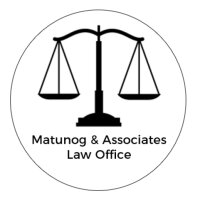Best Energy Regulatory Law Lawyers in Davao City
Share your needs with us, get contacted by law firms.
Free. Takes 2 min.
List of the best lawyers in Davao City, Philippines
About Energy Regulatory Law in Davao City, Philippines
Energy Regulatory Law governs the generation, transmission, distribution, and retail of energy in the Philippines, including Davao City. It involves a broad range of legal frameworks that ensure energy providers comply with national policies, tariffs, safety standards, and environmental protections. Because Davao City is one of the largest urban centers outside Metro Manila, its energy sector is crucial for economic growth and development, making Energy Regulatory Law an important area for local businesses and consumers alike.
The Energy Regulatory Commission (ERC) is the primary government body responsible for enforcing and overseeing energy regulations. Local government units in Davao City coordinate with national agencies and utility companies to ensure the reliability, affordability, and sustainability of electricity supplied to residents and industries. With the push for renewable energy and competitive electricity markets, navigating the legal landscape of the energy sector often requires specialized legal knowledge.
Why You May Need a Lawyer
There are several situations in which dealing with Energy Regulatory Law in Davao City may require legal advice or representation. Some of the most common include:
- Challenging electricity rates, tariffs, or billing disputes with local utility providers.
- Applying for permits and licenses for energy-related projects, such as solar panel installations or small power generation units.
- Dealing with compliance issues stemming from ERC and Department of Energy (DOE) requirements.
- Negotiating power purchase agreements and connection contracts.
- Addressing issues related to power interruptions and service reliability.
- Handling environmental and zoning concerns for energy developments.
- Representing interests in public hearings or regulatory proceedings before the ERC or other agencies.
- Troubleshooting penalties, legal warnings, or notices of violation involving energy consumption or installation.
Due to the complexity of the energy sector, both individuals and businesses often benefit from legal guidance to avoid penalties or take full advantage of available incentives.
Local Laws Overview
Energy Regulatory Law in Davao City operates within the framework of several national statutes and regulations, as well as local ordinances. Key elements include:
- Electric Power Industry Reform Act (EPIRA) of 2001 (RA 9136): This national law reorganized the Philippine energy sector, promoting competition and consumer choice, while also strengthening regulatory oversight.
- Energy Regulatory Commission (ERC) rules: The ERC is responsible for issuing, reviewing, and enforcing rules on rates, licensing, safety, and practices of all power industry participants.
- Renewable Energy Act of 2008 (RA 9513): Encourages the development and use of renewable energy, offering incentives for solar, wind, biomass, and hydroelectric projects. Davao City supports such initiatives to increase sustainable energy sources.
- Philippine Distribution Code and Grid Code: These set technical and performance standards for electricity providers in transmission and distribution, including those operating in Davao City.
- Local permits and zoning regulations: Davao City issues business permits and clearances for energy projects. Compliance with local environmental and safety standards is mandatory.
- Consumer Protection Laws: These ensure fair billing, protection from unjust disconnection, and avenues for redress in the event of disputes with electric cooperatives or private distributors operating in Davao City.
Understanding these regulations is vital, especially as the local government increasingly encourages investment in clean energy and modernization of the power grid. Legal professionals help interpret these complex laws and ensure compliance.
Frequently Asked Questions
What government agencies oversee energy regulation in Davao City?
The primary authority is the Energy Regulatory Commission (ERC), which sets rates and enforces regulations. The Department of Energy (DOE) provides policy direction, and local government units issue necessary permits and enforce compliance at the city level.
How are electricity rates set in Davao City?
Electricity rates are primarily set by the ERC after public hearings and a review of costs submitted by electricity providers. Factors include generation charges, transmission, distribution, and taxes.
Can consumers challenge their electricity bills?
Yes, consumers can raise disputes directly with their service provider or escalate their complaint to the ERC or local government consumer welfare desks if the issue is unresolved.
What is net metering, and is it available in Davao City?
Net metering allows consumers, such as homeowners with solar panels, to sell excess electricity back to the grid. Davao Light and Power Company, the main distributor in the city, supports net metering in compliance with the Renewable Energy Act.
Are there incentives for renewable energy projects in Davao City?
Yes, national incentives such as tax holidays, duty-free importation of equipment, and priority grid connection are available for eligible projects. Davao City also supports renewable energy through expedited permitting for green developments.
What permits are needed to build an energy facility in Davao City?
Multiple permits are required, including an ERC-issued Certificate of Compliance, business permits from the Davao City government, environmental clearances from DENR, and compliance with local zoning laws.
What should I do if I receive an ERC notice of violation?
You should consult a lawyer experienced in Energy Regulatory Law as soon as possible to respond appropriately, gather evidence, and address the alleged violations in a timely manner.
How are power outages and service reliability regulated?
Power utilities in Davao City must comply with service reliability standards set by the ERC and Philippine Distribution Code. Chronic service failures may be grounds for complaints or legal action.
Can businesses negotiate power purchase agreements (PPAs) with suppliers?
Yes, qualified businesses or large consumers can contract directly with energy suppliers under open access rules implemented by EPIRA, subject to regulatory approval.
How can I find a lawyer specializing in Energy Regulatory Law in Davao City?
You may contact local law offices, the Integrated Bar of the Philippines - Davao Chapter, or seek referrals from industry associations such as the Philippine Independent Power Producers Association.
Additional Resources
- Energy Regulatory Commission (ERC): The main government regulator for the electricity sector. Offices and assistance are available for hearings, complaints, and regulatory filings.
- Department of Energy (DOE): Handles policy, project registration, and inquiries related to energy laws and incentives.
- Davao Light and Power Company: The primary distribution utility serving Davao City.
- Integrated Bar of the Philippines (IBP) - Davao Chapter: Provides a directory of licensed lawyers who can assist with regulatory cases.
- City Government of Davao: Business permits and licensing office, City Planning and Development Office for zoning and project approval.
- Department of Environment and Natural Resources (DENR): For environmental compliance certificates required in energy projects.
Next Steps
If you need legal assistance in Energy Regulatory Law in Davao City, start by identifying your specific concern - whether it is a billing dispute, a compliance issue, or a project requiring permits. Gather all relevant documents, such as contracts, correspondence with energy providers, and notices from regulators. Reach out to a lawyer or law firm with experience in energy regulation. Prepare to discuss your situation, goals, and any deadlines involved.
You may also contact the agencies mentioned above for initial guidance. For complex or contentious matters, legal representation is strongly recommended to ensure your rights are protected and to navigate the regulatory process efficiently.
Remember, Energy Regulatory Law is a specialized field, so choosing a lawyer familiar with both national and Davao City-specific regulations will greatly improve your chances of a favorable outcome.
Lawzana helps you find the best lawyers and law firms in Davao City through a curated and pre-screened list of qualified legal professionals. Our platform offers rankings and detailed profiles of attorneys and law firms, allowing you to compare based on practice areas, including Energy Regulatory Law, experience, and client feedback.
Each profile includes a description of the firm's areas of practice, client reviews, team members and partners, year of establishment, spoken languages, office locations, contact information, social media presence, and any published articles or resources. Most firms on our platform speak English and are experienced in both local and international legal matters.
Get a quote from top-rated law firms in Davao City, Philippines — quickly, securely, and without unnecessary hassle.
Disclaimer:
The information provided on this page is for general informational purposes only and does not constitute legal advice. While we strive to ensure the accuracy and relevance of the content, legal information may change over time, and interpretations of the law can vary. You should always consult with a qualified legal professional for advice specific to your situation.
We disclaim all liability for actions taken or not taken based on the content of this page. If you believe any information is incorrect or outdated, please contact us, and we will review and update it where appropriate.









